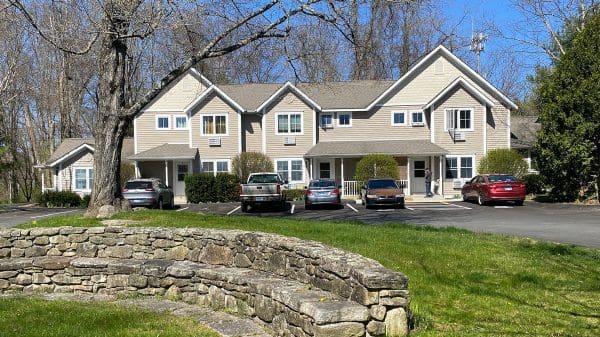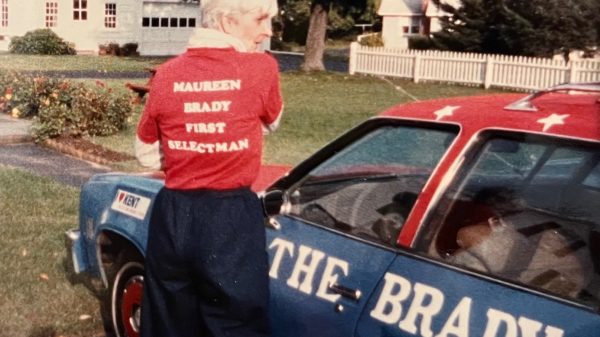KENT—The Board of Selectmen will consider the future of the food scraps recycling program at the town’s transfer station when it convenes on Tuesday, May 7. A pilot program initiated last year by the Department of Energy and Environmental Protection is coming to an end and town officials must decide on a fee structure and how it will be administered if the town continues in the program.
Under the pilot program, the town reduced its annual transfer station permit fees to $125 for those volunteering to participate in the food scraps program, which called for residents to separate organic materials and to process municipal solid waste (MSW) in orange bags. Seniors participating in the program, who are presumed to produce less MSW, paid $115 for their permits, and those taking out only food scrap recycling permits paid $20.
With the pilot program ending, town officials are considering variations on the “pay as you throw” theme, where residents must purchase distinctively colored bags through the town to deposit of MSW. Ideally, residents would continue to separate organic wastes for composting, either at home or through the town.
In March, Housatonic Resource Recovery Authority Director Jennifer Heaton-Jones outlined three models for the coming fiscal year and said the selectmen had an extended deadline of May 15 to tell the state which one most closely fits the town’s profile. The first two options entailed different permit fees, bag distribution methods and methods of charging for disposal. The last model would not use special bags but would require a transfer station “punch card” and payment by the weight of the bag.
Believing that they had a July 1 deadline to implement the changes, First Selectman Martin Lindenmayer first told Heaton-Jones and Recycling Coordinator Tiffany Carlson that they wanted to continue the town’s original permit fees of $150 per household and $130 for seniors for the coming fiscal year “because we need time for implementation.”
He said they would use the summer to refine the system, deciding among the different options presented in April. Department of Public Works foreman Rick Osborne said it was unclear where and how soon the town could obtain the requisite bags. “Whether we can be done by July 1, I don’t know,” he said.
Carlson reassured the board that there was plenty of time for implementation. “If you are thinking about unit-based pricing, you can ask [DEEP] for bridge financing and an extension of when it goes into place,” she said.
“Other communities are going through process, and some have even received money for an additional attendant for a year,” added Heaton-Jones. “Ultimately, it has to be the number-one goal to make it financially sustainable. DEEP wants us to work with them on a path to permanency. If you need to buy yourself time, an extension could be put in place that says the plan won’t execute until Jan 1.”
Selectmen Lynn Mellis Worthington and Glenn Sanchez both stated they wanted to implement the program in July. When the pilot program ends, the program would become mandatory as opposed to voluntary participation in the pilot program.
Worthington wondered how many more permit holders would be persuaded to join the food scraps composting initiative if the town charged for disposal of MSW by the bag. Organic waste is heavier than other solid wastes and increases the town’s tipping fees with HRRA.
Heaton-Jones said that other communities have found the diversion of organic waste to be a key component. “This past year, when it was not mandated, we reduced MSW by 12 percent,” she said. “That says a lot.”
During the first eight months of the voluntary program, Kent residents separated out about two tons of organic waste each month, making it the third most successful of the 15 towns in the pilot program.
Talk turned to the logistics of implementing the program, Osborne predicted push-back from residents. He also said that one staff member would have to continuously watch what kinds of bags were being deposited, but Heaton-Jones said that residents in other towns quickly became self-policing, calling out “cheaters” who tried to bring in MSW in unauthorized bags.
“I feel your pain,” said Heaton-Jones, “It’s hard to change. But unit-based pricing is common across the state. You just have to decide what will work best for your community. Everyone can throw away their garbage; they can throw away as much as they want—they just have to pay for it.”
Osborne noted that people who are cleaning out homes often bring in large amounts of material. “I think most people will cooperate, but there are people who clean out houses and bring 30-40 bags,” said Osborne. First Selectman Marty Lindenmayer wondered if there should be larger bags for these circumstances.
“You have to be creative and put it in the price structure,” said Heaton-Jones. “The rest of the town should not have to pay for their 15 years of junk.”
She suggested the possibility of having once- or twice-yearly days when a bin would be provided to receive bulky waste free of charge. “The rest of year, it would be pay as they throw,” she said.


























